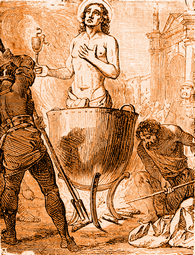Lives of the Saints
Our Models and Protectors
Spiritual Bouquet:
May 6

Saint John
before the Latin Gate
(95 A.D.)
In the year 95, Saint John the Evangelist, the only surviving Apostle, who was governing all the churches of Asia Minor (present-day Turkey), was apprehended at Ephesus and sent in chains to Rome. The Emperor Domitian did not relent at the sight of the venerable old man, but condemned him to be cast into a cauldron of boiling oil. The martyr doubtless heard, with great joy, this barbarous sentence; the most cruel torments seemed to him light and agreeable because he hoped they would unite him forever to his divine Master and Saviour. But God accepted his will and crowned his desire; He conferred on him the honor and merit of martyrdom while suspending the operation of the fire, just as He had formerly preserved the three children from injury in the Babylonian furnace. The seething oil was changed for him into an invigorating bath, and the Saint came out more refreshed than when he had entered the cauldron.
The glorious triumph of Saint John happened just beyond the gate of Rome called the Latina. A church which ever since has borne this title was consecrated there, in memory of the miracle. Domitian saw this miracle without deriving the least advantage from it, remaining hardened in his iniquity. Nonetheless, he contented himself afterwards with banishing the holy Apostle to the little island of Patmos. Saint John returned to Ephesus during the mild reign of Nerva (96-98), who during his short imperial government lasting one year and four months, merely labored to restore the faded luster of the Roman Empire.
Reflection. Saint John suffered above the other Saints a martyrdom of love, being a martyr and more than a martyr, at the foot of the cross of his divine Master. All Our Lord's sufferings were by love and compassion imprinted in his soul, and thus shared by him. O singular happiness, to have stood under the cross of Christ! O extraordinary privilege, to have suffered martyrdom beside Jesus, and been eye-witness of all He did or endured! If nature revolts within us against suffering, let us call to mind those words of the divine Master to Saint Peter: Now thou knowest not why, but thou shalt know hereafter. (John 13:7)
Little Pictorial Lives of the Saints, a compilation based on Butler's Lives of the Saints and other sources by John Gilmary Shea (Benziger Brothers: New York, 1894)